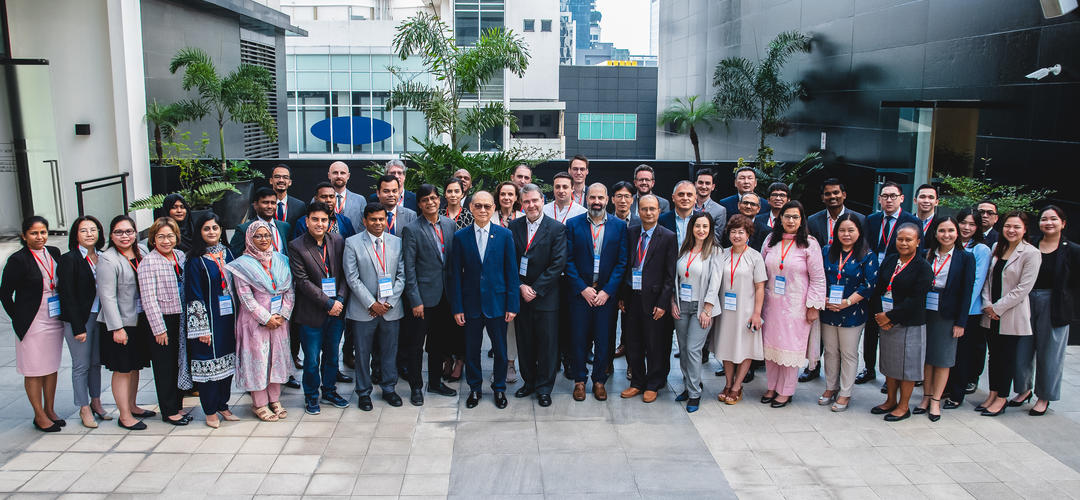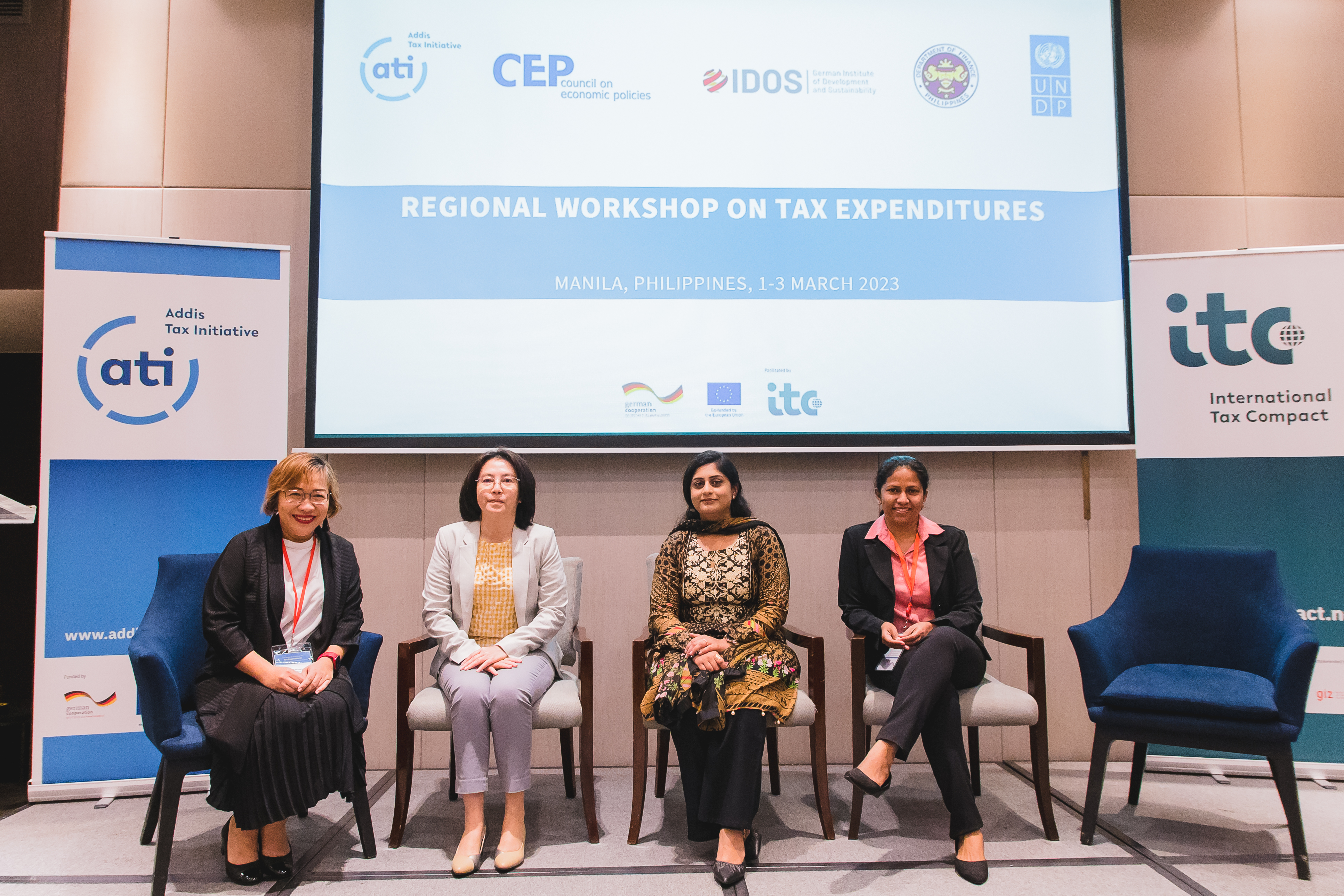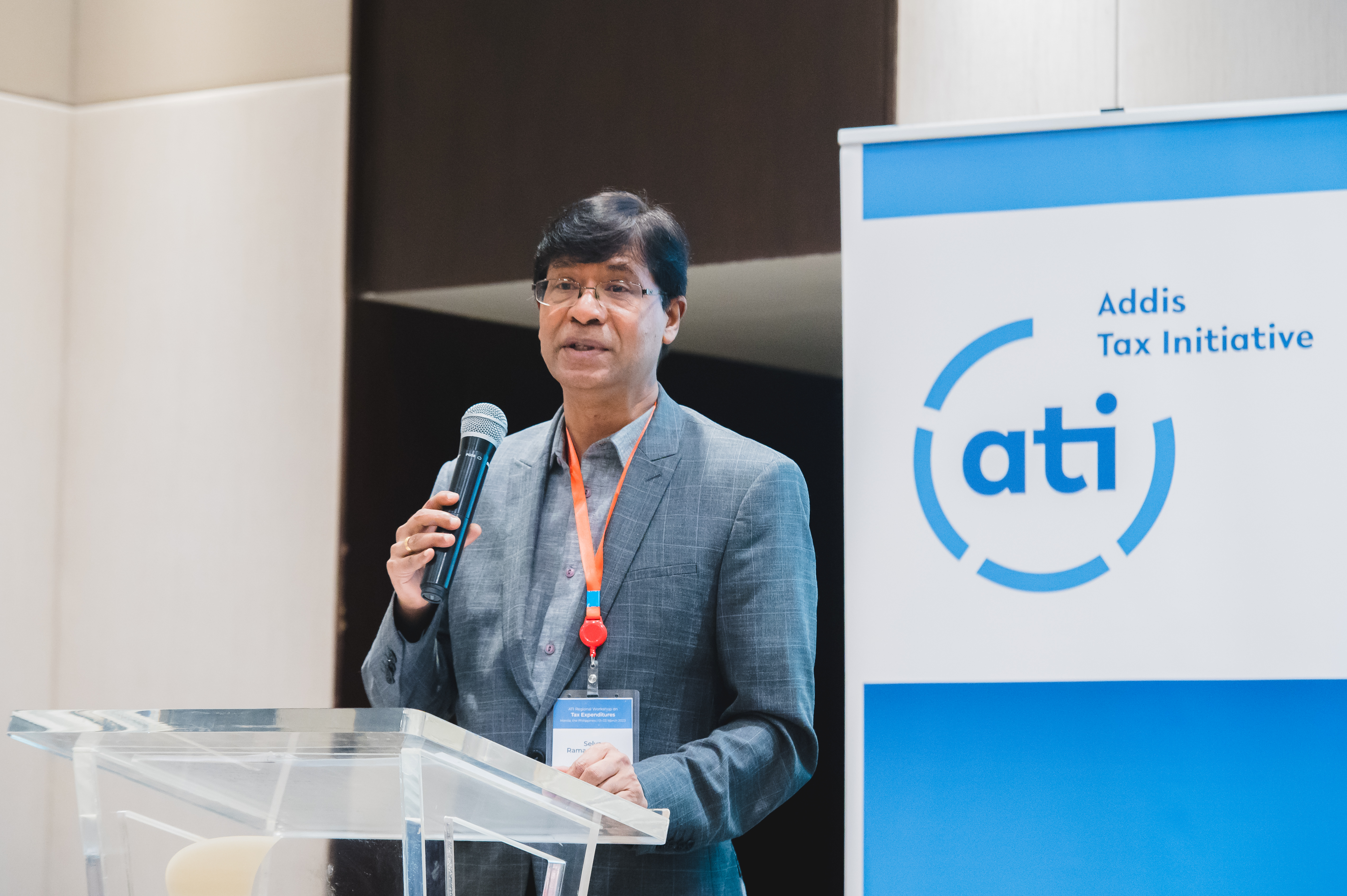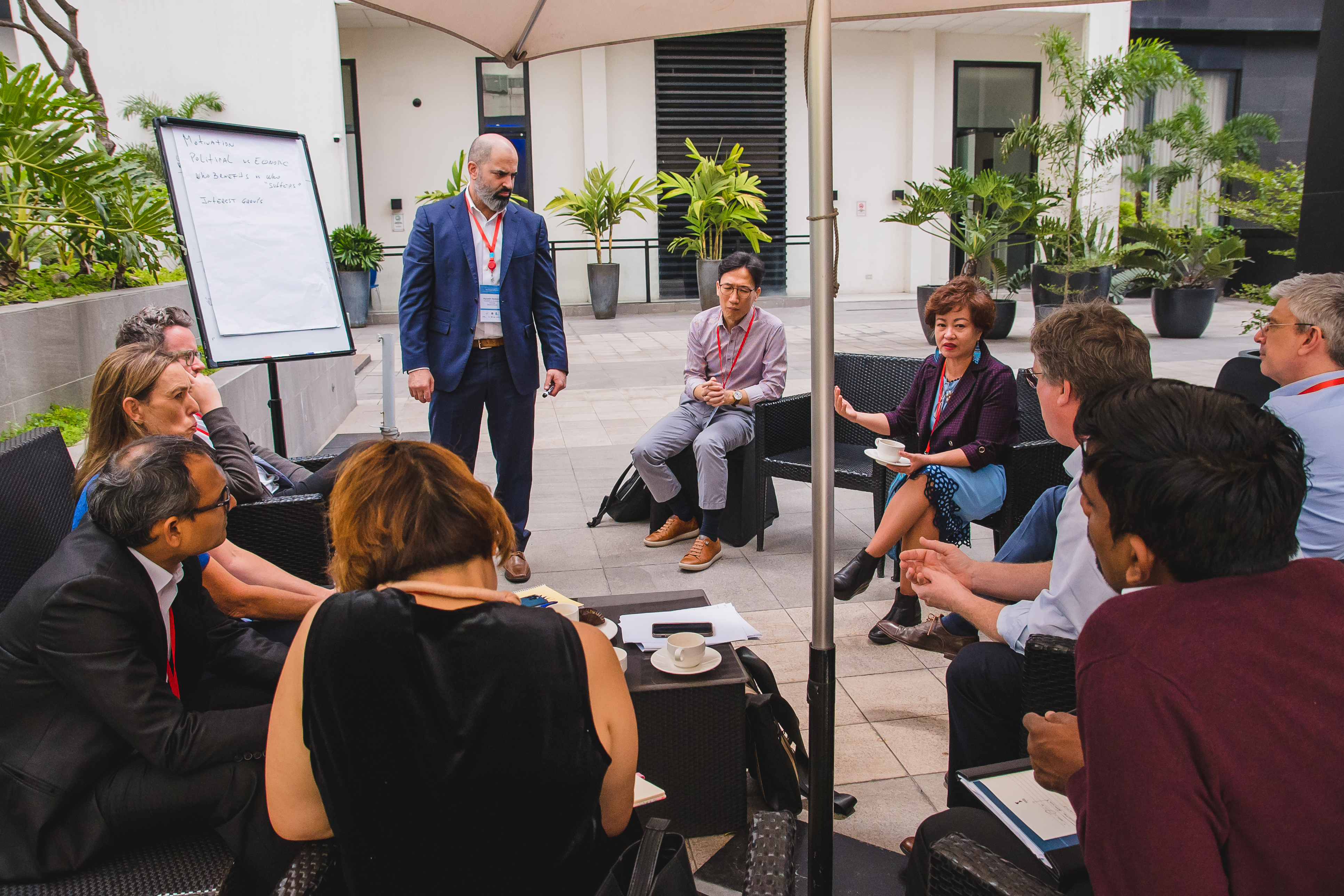

Insights from Asia on Tax Expenditures
Read the full report.
Over the past 30 years, the global average of reported revenue forgone from tax expenditures (TEs) was close to 4 per cent of GDP and more than 24 per cent of tax revenues (GTED progress report 2022). It is clear that TEs play a significant role in government budgets. However, they are often not subject to the same level of scrutiny in the budgeting process as direct spending. Despite the impact of TEs on government budgets, only 116 out of 218 jurisdictions have ever published an official TE report.
On 1-3 March 2023, regional and international experts and practitioners on tax-related issues convened in Manila, the Philippines, to exchange with counterparts on the impact of and strategies how to deal with TEs – informing the global debate from an Asian perspective.
Governments use TEs – deviations from a benchmark tax system – to provide financial support or benefits to individuals, companies, and other entities, resulting in a reduction in the government’s tax revenue. The three-day workshop in Manila offered a platform to jointly identify strategies to improve tax expenditures’ estimation, reporting, and evaluation while strengthening regional and global TEs networks. It facilitated peer exchange and learning among participants from 16 countries.
This workshop was the third in a series of regional workshops organised by the Addis Tax Initiative (ATI), in partnership with the German Institute of Development and Sustainability (IDOS) and the Council on Economic Policies (CEP). On this occasion, the Department of Finance (DOF) of the Philippines and the United Nations Development Programme (UNDP) joined as local partners.
Nine sessions over the course of three days featured presentations from representatives of ministries of finance and revenue administrations of a number of Asian countries including Armenia, Bangladesh, Georgia, Indonesia, Laos, the Maldives, Mongolia, Nepal, Pakistan, the Philippines, Solomon Islands, and Sri Lanka. Participants sparked rich discussions on key aspects of TE management together with delegates from UNDP’s hubs in Kyrgyzstan and the Philippines, World Bank and International Monetary Fund (IMF) experts, representatives of Oxfam Vietnam, the Asian Development Bank (ADB), the Organisation for Economic Co-operation and Development (OECD), and the UK’s Foreign, Commonwealth and Development Office (FCDO) as well as advisors of the ATI, IDOS, CEP, the Overseas Development Institute (ODI), and the International Institute for Sustainable Development (IISD).

Tax Expenditures from an Asian Perspective
The first day of the workshop covered topics such as the governance, benchmarking, and estimation of tax expenditures. The need for a sound legislative and regulatory framework around TEs that clearly states its policy objectives was highlighted in order to ensure coherence across tax expenditures and other spending programmes or commitments. In defining TEs, countries should align them with a benchmark taxation system based on key principles of good tax policy design, including fairness, efficiency, and simplicity. Participants recognised the challenges that these exceptions from the benchmark rule pose, as terms and definitions can be controversial and vary between countries. Revenue forgone estimations through TEs were also discussed during the first day of the workshop. Attendees explored cutting-edge and innovative approaches to calculating the monetary value that governments lose due to TEs – specifically concerning various tax bases and the type of tax expenditures.
The second day of the workshop highlighted the lack of transparency and scrutiny in the budgeting process surrounding TEs. Many countries do not publish official TE reports and the ones that do often lack detail on policy objectives and legal references. Thematic sessions revealed ongoing challenges in reducing fossil fuel subsidies (FFSs) – largely granted through TEs – and the importance of considering the international dimension of taxation when granting tax expenditures. This topic drew a lot of attention as tax incentives for the extractive sector are particularly relevant to Asian countries that are highly dependent on mineral and fuel exports. In addition, the global energy crisis shows that governments not only struggle to reduce FFSs but are moving in the opposite direction. The representative of UNDP Philippines also highlighted the timeliness of the event:
“The workshop is organised in an opportune moment, when countries are struggling with a global crisis and monetary tightening, increased living costs, and the negative impacts of climate change”.

The following session provided detailed insights into tax incentives for investments; the discussions took place around the implementation of the Base Erosion and Profit Shifting (BEPS) Pillar 2 Solution and its two key components against the backdrop of existing TEs in a jurisdiction: the Global Anti-Base Erosion (GloBE) proposal and the Subject-to-Tax Rule (STTR). Pillar 2 seeks to ensure that multinational enterprises pay a minimum level of (effective) tax, regardless of where they operate, through the implementation of a global minimum tax rate. This would prevent shifting profits to low-tax jurisdictions and thus ensure that they pay their fair share of taxes.
The relevance of tax expenditures in achieving the Sustainable Development Goals (SDGs) was also pointed out in Manila. Besides technical aspects, participants exchanged on the crucial impact of TEs in advancing to the SDGs. “Domestic resource mobilisation is the most effective way to achieve the SDGs”, underlined the representative from Laos.
The last day of the workshop focused on TE evaluation. The magnitude of tax expenditures needs accurate forecasting and estimation of their fiscal costs to ensure transparency and accountability. Such estimates are also a vital input to evaluate TE provisions against their effectiveness to reach the stated goals they should serve. Furthermore, these estimations serve to assess potential side effects and externalities they could trigger. Thus, comprehensive evaluations of TEs are crucial to identify those provisions that have a sustainable value and those that need to be reformed or simply dismantled.
Political support, evidence-based data that shows the opportunity costs of revenue loss through TEs, and the importance of communication strategies were highlighted by the Philippines’ Department of Finance representative as key factors for the success of reform processes. The last session provided an opportunity to discuss the requirements and challenges of TE reform.
TEs estimation, reporting, and evaluation are crucial in driving evidence-based reform of tax expenditure systems; they make it possible to identify inefficient and obsolete TEs and align tax systems with the sustainability and inclusive growth agenda of governments. By doing so, countries can mobilise domestic resources and finance their development strategies more effectively. This was illustrated by insights from the Maldives’ experience of the reform of their TE system: the reform led to revenue raise, despite remaining challenges with regards to monitoring and evaluation.
Presentations, case studies, video interventions, breakout and Q&A sessions facilitated the exchange of knowledge and experiences among participants and stimulated their engagement. The regional workshop on TEs with a focus on Asia served as an opportunity for ATI member countries and other interested governments to have an exchange with regional partners and international experts on tax expenditures.
Countries in the region have increased their efforts to improve tax expenditure systems, but much remains to be done. The overall takeaway of this regional workshop is clear: governments can drive evidence-based reform and achieve more sustainable and inclusive growth for their citizens by continuing to pay attention to estimating, reporting, and evaluating tax expenditures.

Moving forward
This series of regional workshops aims at creating a platform for tax officers, policymakers, experts, researchers, and other stakeholders to share their experiences and expertise. The objective is to increase knowledge through the exchange among workshop participants – strengthening regional and global networks that nurture learning opportunities.
The event in Manila is the third edition of a series of regional workshops. Each workshop is followed by a technical meeting (to be held approximately a year after the first workshop). Stakeholders will then discuss the progress made in the field of tax expenditures. The first regional workshop on tax expenditures took place in Lagos (Nigeria) in July 2022, and the second edition was held in Nairobi (Kenya) in October 2022 with a focus on West and East Africa respectively.
The Addis Tax Initiative
This series of regional workshops on TEs is jointly organised by the ATI, IDOS, and CEP. It builds on Commitment 3 of the ATI Declaration 2025 which states: “We will improve tax transparency by publishing tax expenditures regularly to facilitate cost-benefit assessments, ultimately helping to reduce wasteful tax expenditures, improving taxpayers’ trust, and creating a more level playing field for all types of businesses. We will improve inter-agency cooperation on tax expenditures and foster the coordination of granting tax concession activities”.